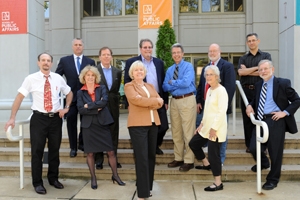Research
SPA Faculty Help Shape Fields as Editors of Scholarly Publications

SPA has always taken pride in great instruction, talented students at all levels, and accomplished alumni. Another bragging right is just as impressive and helps our faculty offer cutting edge research in our classrooms: The school’s three departments – Public Administration and Policy, Government, and Justice, Law & Society – have been and continue to be leading hubs of influential scholarly journal and book series editors. In these roles, SPA faculty members help shape their respective fields.
SPA Dean Barbara Romzek reflected on this long-standing pattern by saying, “The role that SPA faculty members have played as journal and book series editors is recognition of the quality of their scholarship and the respect these individuals enjoy in their respective fields. Supporting journal editorship is just one of the many ways SPA at American University supports quality research and contributes to scholarly dialogue.”
Editors play an extraordinary role in helping to shape their fields. Editing a leading journal or book series is an honor reserved to those who are considered among the best in their fields. Jan Leighley of the Department of Government has been editor or co-editor of two of the three leading journals in political science, and currently she is co-editor of Journal of Politics. Other SPA faculty have been both journal editors and founding editors, including Distinguished Professor David H. Rosenbloom of the Department of Public Administration and Policy, University Professor Emerita Rita Simon of the Department of Justice, Law & Society, Karen O’Connor, the Jonathan N. Helfat Distinguished Professor of Political Science, and Distinguished Professor James Thurber of the Department of Government.
These pillars of the academic editorial world are acknowledged for their discernment and also the length of their service. Rosenbloom was editor-in-chief of the prestigious Public Administration Review, from 1991-1996, and editor-in-chief of Policy Studies Journal. Simon edited Gender Issues for 15 years and was the first editor of Justice Quarterly, now one of the top journals in criminology and criminal justice, and the official journal of the Academy of Criminal Justice Sciences. Thurber served as a founding editor of Congress and the Presidency, and O’Connor was on the founding editorial board of Women & Politics.
The work that SPA faculty members do as editors is both demanding and rewarding. Editors make determinations regarding the importance of a manuscript, identify the best people to evaluate those manuscripts, and then weigh the quality of the opinions that reviewers make on manuscripts. In doing so, editors serve as intellectual arbiters for their fields. They make critical judgments about what the important issues are and which individuals are making the most substantively significant and methodologically sound contributions in the fields that address these issues.
Leighley describes the journal editor’s role “as an opportunity to see a broad range of work early on” and to be a “steward” for her discipline. Editors at leading journals “shepherd, rather than fashion” author’s pieces, according to Leighley.
She adds that the experience varies based on the type of the journal, but that all editors are concerned with identifying “cutting edge, leading research, or work that will be cited and discussed.” And a visionary editor also has an opportunity to invest in a “longshot”—an article that needs more development but shows promise or offers insights into relatively unexplored topics.
Government Professor Gregg Ivers, a long-time co-editor of the University of Virginia Constitutionalism and Democracy book series, enjoys the opportunity of working with both emerging and established scholars in this capacity.
Book series “offer authors and subsequently readers an extended discussion of a topic,” according to Ivers. “A book editor is more than a gate-keeper. It’s a privilege to be able to help shape the way people think about a field through these lasting efforts.”
Ivers also acknowledges the advantage of being part of a reputable series: “I’ve benefited from my work being published as part of a series. Now, I enjoy extending this opportunity to scholars with interesting ideas and strong research.”
Being an editor of a journal or book series also tests one’s mettle. For example, a journal editor has the duty to share feedback with the author through a letter of acceptance or, more commonly, rejection. This step may be brief or lengthy, terse or thoughtful. According to Justice, Law & Society professor and chair and former associate journal editor Ed Maguire, “It’s the kind of experience that makes you really think about the kind of person you want to be in this role.”
No matter how they answer Maguire’s question, the faculty listed below are continuing SPA’s 80-year legacy of helping shape their scholarly fields and bringing cutting-edge research to the classroom and to practice:
Journal editors (pdf)
Book editors (pdf).
